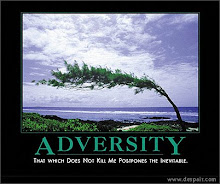When I was six, my Father moved out of State, and I didn't see him for the next 35 years. When he and my Mother separated, we lived with my maternal grandparents, who were rather well-off financially, owning their own business. So, when he left, there was no need to legally pursue him for child support. I'm sure that they all thought that there was nothing that my Father could ever really provide for me, and that I didn't need him in my life; but Fate had other plans.
Fast-forward to me at age 41; I had heard that my Father's second wife had died of cancer after a long illness. Shortly after this happened, he began writing to me, and I wanted absolutely nothing to do with him! He wrote that there had never been a single day in his life when he didn't think of me, and asked for my forgiveness.
I was adamant that he didn't deserve a chance to get to know the daughter he had so willfully neglected, but my husband made me realize that I should at least hear his side of the story. He said that if I turned my own Father away without giving him a chance, that I would most likely regret it later on: if my Father passed away without me knowing the answers to so many of my questions, how would I feel then?
Reluctantly, and fearful of being hurt even further, I began corresponding with him on a regular basis. This grew into weekly, lengthy telephone calls where we both learned a lot about each other. My Father never maligned my Mother; he just said, as she always had, that they loved each other, but the relationship didn't work out. I also found out the reason why he couldn't have stayed in the marriage, and realized that he was entirely justified in leaving. It was a very sad situation. I finally understood that their breakup wasn't my fault; children often blame themselves when a parent leaves the family.
Finally, the day came when my Father knocked on my door after 35 years, and it was as if a part of myself had been restored. Knowing him helped me to truly understand many aspects of my personality: my love of poetry and literature, singing and performing, history and architecture, and many other qualities that I could trace back to him. It was comparable to finding a "me" that I had never really known. I had been given a great gift, and I was very thankful for this second chance to love and be loved by my own Father. I had my "closure", and my life was so much richer for it.
Sadly, three years after our reunion, and 1 year after his marriage to a wonderful woman, he was diagnosed with terminal stomach cancer. From the beginning, he was stoic and pragmatic. He patently refused chemotherapy, and I remember being so angry at him about his decision. I had just found him again, and now, I was going to have to lose him, just like I had experienced at age 6. This time, it would be forever - how could he possibly justify making this choice?
My Father's reasoning was that he had known a very close friend with the same type of cancer. This friend was treated with chemotherapy and lived in excruciating pain, with no quality of life, until he died an agonizing death a few months later. So, although my Father was given a few months to live, he decided that as there was no hope of saving his life, that he would live "as fully as possible, for as long as humanly possible". He turned out to be absolutely right.
He remained his entertaining, larger-than-life self throughout, for almost the next two years. He romped and took naps with his beloved Boston Terrier, "Teddie" (a gift from my Stepmother on his return from the hospital following his cancer surgery). He gardened, traveled, danced weekly at his social club, wrote poetry, watched hours (and hours!) of boxing matches, growing more gaunt and haunted-looking each time I visited him. All of his food had to be put through the blender so he could even try to eat, and several procedures were done to stretch his esophagus, but nothing really helped. He became a shadow of my cute, dear, funny Daddy, and it truly broke my heart.
Whenever the tears would come, he would always say,"No crying!", and I obeyed. He really didn't allow anyone to be negative or depressed around him; it was his way, and we all respected that. You could tell that he was in pain, but he refused to acknowledge it, and never once did I hear him complain about his circumstance. If something couldn't be changed, you accepted it, and that was that. He always wanted to concentrate on what was still good about life, and that was a valuable lesson to me.
About a month before he died, I flew down to Florida for what was our last visit. He loved black raspberry ice cream, and we managed to get him in the car for the short drive to the ice cream shop. He was in his pajamas, looking terribly weak and unwell. He couldn't walk, so I brought the ice cream out to the car. I could tell that he really enjoyed it, and I wondered how many days he would have left...
When I was diagnosed with cancer, I decided to follow my Father's example, and not ever feel sorry for myself. His strength and his unfailing ability to see the good in every day gave me so much inspiration, and they still do. I never could have imagined that his cancer experience would be a source of strength for me several years later as I made my own journey through treatment. Thank you, Daddy; I love you today and always...


